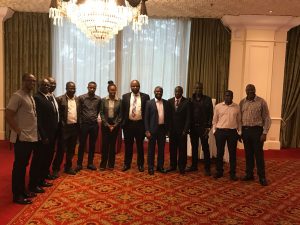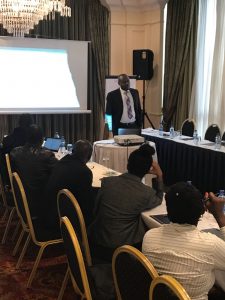Researchers from University of Reading in the UK held a fruitful and stimulating workshop on ’Capacity Needs Assessment for Green Economy Transition in Africa’ in Nairobi, Kenya on March 12th 2018.
The workshop, which was held in the Hilton Hotel, was attended by academics from the University of Nairobi and technical officers from public and private sectors, as well as civil society organizations involved in planning and implementing green growth initiatives in Kenya. The workshop was funded by the University of Reading under the Global Research Strategic Fund. The Project is led by Professor Chukwumerije Okereke from the Department of Geography and Environmental Science, who is Associate Director of the Centre for Climate and Justice at the University of Reading, with contributions from scientists from Oxford Brookes University and African Technology Policy Studies in Nairobi.
The workshop featured presentations, survey questionnaire completion, focus groups and structured reflection over green growth policymaking and implementation in Kenya with a focus on human and technical capacity.

The adoption of the 2030 Agenda for Sustainable Development and African Agenda 2063 in 2015 by African Governments had come against a backdrop of growing economy in many African countries. However, despite notable gains in recent years, economic growth has not translated into reduction in poverty and inequality. At the same time, it is widely recognized that the current reliance on finite natural resource extraction to power African economic development is unsustainable in the long run. Moreover, Africa’s economic development is being hampered by climate change, which has a negative impact on food production and imposes extra costs on infrastructural development. Hence, business-as-usual models of growth are no longer a viable option for Africa in the face of growing environmental scarcity, economic uncertainty, and widespread poverty.
Green growth is a recent global phenomenon and a much-lauded pathway for achieving economic transformation, climate resilience, and inclusive, sustainable development. Green growth is a relatively new approach for policymakers and businesses in Africa. While there are a few notable promising steps, African countries are mostly yet to understand and exploit the various opportunities for developing the green economy across scales from national through to the regional level. Scholars and policymakers alike have regularly asserted that lack of or limited capacity is a significant barrier hindering the transition to green growth in Kenya and Africa more broadly. However, there is insufficient understanding of the range of skills (both indigenous and external) that is needed to achieve green economy transition in Africa.
For example, Kenya’s long-term development blueprint, Vision 2030, seeks to transform the country into an industrializing, middle-income country that offers a high quality of life to all people in a clean and secure environment by 2030. Kenya aims to increase annual GDP growth rates to 10% and to maintain that average till 2030. Key programs include the massive development of solar and geothermal energy, increased mechanization of agriculture, green industrialization and innovation, and better monitoring of forests to enhance biological conversation and diversity. However, as in other African countries, there is limited capacity to transform these grand visions into reality.
 A principal rationale for the workshop is that a critical condition for improving capacity is to generate a clear and robust framework that can help policymakers and other stakeholders to assess their capacity needs systematically. In the workshop, the participants were presented with an analytical framework for green growth transition which is being developed by Professor Okereke and his research team. The analytical framework, which is adapted from the UNDP’s generic model, identifies five functional capacity areas needed for green growth transitioning in Africa and more broadly. These include strategy and policy formulation, project design and implementation, stakeholder engagement, financial management, and monitoring and evaluation.
A principal rationale for the workshop is that a critical condition for improving capacity is to generate a clear and robust framework that can help policymakers and other stakeholders to assess their capacity needs systematically. In the workshop, the participants were presented with an analytical framework for green growth transition which is being developed by Professor Okereke and his research team. The analytical framework, which is adapted from the UNDP’s generic model, identifies five functional capacity areas needed for green growth transitioning in Africa and more broadly. These include strategy and policy formulation, project design and implementation, stakeholder engagement, financial management, and monitoring and evaluation.
Participants were invited to rank the capacity strengths and needs of their sectors based on the above five functional capacity areas. Their rankings were subsequently discussed alongside in-depth deliberation on what can be done to accelerate capacity building and mobilization for green transitioning in Africa.
A similar workshop is planned in Abuja, Nigeria on March 26th, after which the results will be collated and published in a short report. It is hoped that the project will result in the development of a green capacity template that will improve national green capacity auditing and assessment in sub-Saharan Africa.
Professor Okereke says,
“I am very thankful to the University of Reading for funding this project. I am very much looking forward to the forthcoming workshop in Nigeria. I am very hopeful that the project will contribute to an understanding of steps that are needed to help accelerate capacity development for green transiting in Africa.”

